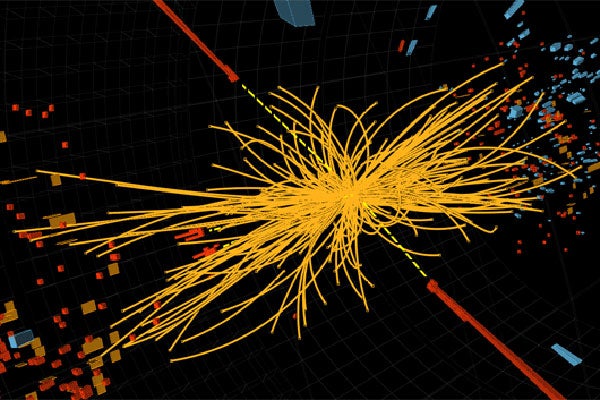Why Is The Higgs Boson So Hot Right Now? Let’s Break It Down

UPDATE: Over a year after Peter Higgs and François Englert made waves with their discovery of the space responsible for the mass and diversity of the universe, the two scientists have received the ultimate recognition. Higgs and Englert have officially won the Nobel Prize in Physics, announced today. They will split the prize of a whopping $1.2 million, which will be awarded at a ceremony in Stockholm in December. Read on for a full primer on their award-winning research. (The New York Times)
Originally published in July 2012: We know how it is — you come back from spiking your lemonade on the 4th, and all anyone can talk about is Katie Holmes and the Higgs boson. Since we've been keeping you adequately up to date on the first, it's only fair that we help explain the latter. So, here's why this theoretical elementary particle is so damn hot right now.
AdvertisementADVERTISEMENT
A collegium of the best scientists in the field announced last Wednesday that experiments conducted using the Large Hadron Collider — essentially an underground, 17-miles-in-circumference magnet-powered racetrack used for smashing particles together — suggested the existence of an exotic, heretofore unseen particle that corresponded to all predicted notions of what a Higgs boson would be. Great. But just in case you’ve deleted all your memories of particle physics from college (a judicious decision, some would argue) you may still be wondering: What is a Higgs boson and why should I care?
See, under the current understanding of how our ol’ universe works — something the guys in lab coats call the Standard Model — the Higgs boson would/could/should be a sub-atomic particle that reacts with other elementary particles like quarks and electrons, to create mass.
One popular explanation works this way: Imagine that a field of Higgs bosons is a sidewalk filled with teen girls. Ask a Justin Bieber particle to walk down the street, and it’s going to have a very hard time moving through all the giggling bosons asking for its autograph — the Bieber particle is massive. A particle that looks like, say, a writer for Refinery29, meanwhile can run across the Higgs field for a sandwich with ease — the writer particle isn’t massive.
Here, mass isn’t best expressed as weight or heaviness as it is in the human scale. On the sub-atomic level, it’s expressed as a characteristic of how different elementary particles interact with the Higgs boson and other yet-undiscovered exotic particles. Having finally found a particle that seems for all intents and purposes to be said Higgs boson, scientists are hopeful that they can now figure out why certain particles are more massive than others, begin proving that the current model of the universe does indeed work, and use their findings to start explaining mysteries contained within that model (like the odd fact that 96% of all the matter in the universe is invisible!).
AdvertisementADVERTISEMENT
That still doesn’t explain why the Higgs boson is trending so hard right now. After all, it isn’t really the “God Particle” it’s been billed as. It’s just another building block of a larger theory and, for all that mass it makes, it still isn’t even the universe’s number-one mass producer. Plus, its sorta-discovery won’t completely prove the Standard Model, and it doesn’t even write its own songs.
Part of the buzz is that, somewhat like Martin Margiela, everyone who’s in the know has been talking about the Higgs for years, tracing the effects it produces, and yet nobody has ever seen proof it actually exists. While, like Margiela, it’s not the only exotic thing out there, it’s become an entrancing enigma made all the more interesting by its absence. Hell, physicists wanted this thing so bad that they wrangled billions of dollars so they could build a giant concrete ring under the French-Swiss border with no other useful purpose than sniffing out Higgs and its cousins.
But, this is more than the end of a foxhunt. Even though Wednesday’s announcement is not conclusive proof that Higgs boson has finally been snapped by that giant camera in Lucerne, it is proof that we can rally around an esoteric goal proposed by some of the brightest, least-understood people in the world, devote countless fortunes to the cause, produce a meaningful step forward in our collective understanding of what the universe is and why we exist in the first place, and get excited about it.
In a time when seeking and celebrating knowledge for the sake of knowledge gets such a bad rap in the press and halls of government, welcoming a new, hard-sought fact on a global stage can itself be news. Sure, the Higgs boson is the superstar here — but the very fact that the people are talking about sub-atomic particles on Twitter, bending their brains to understand the news, and wondering what other questions are still unanswered is more than enough reason to care. We don’t get to do that a lot. So, yeah, this is kind of a big deal. (New York TImes)
Photo: Courtesy of CERN, via The New York TImes.
AdvertisementADVERTISEMENT






